
Immanuel Kant was a German philosopher and one of the central Enlightenment thinkers. Born in Königsberg, Kant's comprehensive and systematic works in epistemology, metaphysics, ethics, and aesthetics have made him one of the most influential and controversial figures in modern Western philosophy, being called the "father of modern ethics", "father of modern aesthetics" and, by bringing together rationalism and empiricism, the "father of modern philosophy".
Idealism in philosophy, also known as philosophical idealism or metaphysical idealism, is the set of metaphysical perspectives asserting that, most fundamentally, reality is equivalent to mind, spirit, or consciousness; that reality is entirely a mental construct; or that there is some higher "ideal form" of reality. Because there are numerous forms of idealism, it is difficult to define the term.

Niccolò di Bernardo dei Machiavelli was a Florentine diplomat, author, philosopher and historian who lived during the Renaissance. He is best known for his political treatise The Prince, written around 1513 but not published until 1532, five years after his death. He has often been called the father of modern political philosophy and political science.
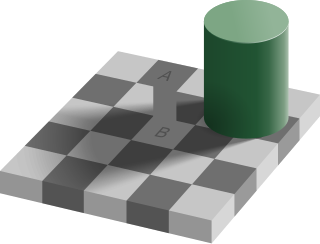
The philosophy of perception is concerned with the nature of perceptual experience and the status of perceptual data, in particular how they relate to beliefs about, or knowledge of, the world. Any explicit account of perception requires a commitment to one of a variety of ontological or metaphysical views. Philosophers distinguish internalist accounts, which assume that perceptions of objects, and knowledge or beliefs about them, are aspects of an individual's mind, and externalist accounts, which state that they constitute real aspects of the world external to the individual. The position of naïve realism—the 'everyday' impression of physical objects constituting what is perceived—is to some extent contradicted by the occurrence of perceptual illusions and hallucinations and the relativity of perceptual experience as well as certain insights in science. Realist conceptions include phenomenalism and direct and indirect realism. Anti-realist conceptions include idealism and skepticism. Recent philosophical work have expanded on the philosophical features of perception by going beyond the single paradigm of vision.
In philosophy, a noumenon is knowledge posited as an object that exists independently of human sense. The term noumenon is generally used in contrast with, or in relation to, the term phenomenon, which refers to any object of the senses. Immanuel Kant first developed the notion of the noumenon as part of his transcendental idealism, suggesting that while we know the noumenal world to exist because human sensibility is merely receptive, it is not itself sensible and must therefore remain otherwise unknowable to us. In Kantian philosophy, the noumenon is often associated with the unknowable "thing-in-itself". However, the nature of the relationship between the two is not made explicit in Kant's work, and remains a subject of debate among Kant scholars as a result.
Magic realism or magical realism is a style of literary fiction and art. It paints a realistic view of the world while also adding magical elements, often blurring the lines between fantasy and reality. Magic realism often refers to literature in particular, with magical or supernatural phenomena presented in an otherwise real-world or mundane setting, commonly found in novels and dramatic performances. Despite including certain magic elements, it is generally considered to be a different genre from fantasy because magical realism uses a substantial amount of realistic detail and employs magical elements to make a point about reality, while fantasy stories are often separated from reality. Magical realism is often seen as an amalgamation of real and magical elements that produces a more inclusive writing form than either literary realism or fantasy.
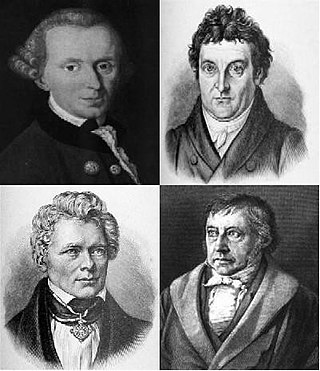
German idealism is a philosophical movement that emerged in Germany in the late 18th and early 19th centuries. It developed out of the work of Immanuel Kant in the 1780s and 1790s, and was closely linked both with Romanticism and the revolutionary politics of the Enlightenment. The period of German idealism after Kant is also known as post-Kantian idealism or simply post-Kantianism. One scheme divides German idealists into transcendental idealists, associated with Kant and Fichte, and absolute idealists, associated with Schelling and Hegel.
In philosophy of science and in epistemology, instrumentalism is a methodological view that ideas are useful instruments, and that the worth of an idea is based on how effective it is in explaining and predicting natural phenomena. According to instrumentalists, a successful scientific theory reveals nothing known either true or false about nature's unobservable objects, properties or processes. Scientific theory is merely a tool whereby humans predict observations in a particular domain of nature by formulating laws, which state or summarize regularities, while theories themselves do not reveal supposedly hidden aspects of nature that somehow explain these laws. Instrumentalism is a perspective originally introduced by Pierre Duhem in 1906.
Scientific realism is the view that the universe described by science is real regardless of how it may be interpreted. A believer of scientific realism takes the universe as described by science to be true, because of their assertion that science can be used to find the truth about both the physical and metaphysical in the Universe.

The Critique of Pure Reason is a book by the German philosopher Immanuel Kant, in which the author seeks to determine the limits and scope of metaphysics. Also referred to as Kant's "First Critique", it was followed by his Critique of Practical Reason (1788) and Critique of Judgment (1790). In the preface to the first edition, Kant explains that by a "critique of pure reason" he means a critique "of the faculty of reason in general, in respect of all knowledge after which it may strive independently of all experience" and that he aims to reach a decision about "the possibility or impossibility of metaphysics". The term "critique" is understood to mean a systematic analysis in this context, rather than the colloquial sense of the term.

Transcendental idealism is a philosophical system founded by German philosopher Immanuel Kant in the 18th century. Kant's epistemological program is found throughout his Critique of Pure Reason (1781). By transcendental Kant means that his philosophical approach to knowledge transcends mere consideration of sensory evidence and requires an understanding of the mind's innate modes of processing that sensory evidence.
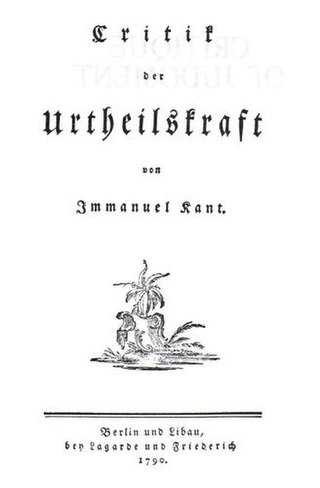
The Critique of Judgment, also translated as the Critique of the Power of Judgment, is a 1790 book by the German philosopher Immanuel Kant. Sometimes referred to as the "third critique", the Critique of Judgment follows the Critique of Pure Reason (1781) and the Critique of Practical Reason (1788).
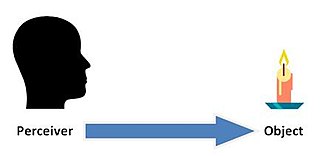
In the philosophy of perception and philosophy of mind, direct or naïve realism, as opposed to indirect or representational realism, are differing models that describe the nature of conscious experiences; out of the metaphysical question of whether the world we see around us is the real world itself or merely an internal perceptual copy of that world generated by our conscious experience.

In metaphysics, conceptualism is a theory that explains universality of particulars as conceptualized frameworks situated within the thinking mind. Intermediate between nominalism and realism, the conceptualist view approaches the metaphysical concept of universals from a perspective that denies their presence in particulars outside the mind's perception of them. Conceptualism is anti-realist about abstract objects, just like immanent realism is.
The analytic–synthetic distinction is a semantic distinction used primarily in philosophy to distinguish between propositions that are of two types: analytic propositions and synthetic propositions. Analytic propositions are true or not true solely by virtue of their meaning, whereas synthetic propositions' truth, if any, derives from how their meaning relates to the world.
Literary realism is a literary genre, part of the broader realism in arts, that attempts to represent subject-matter truthfully, avoiding speculative fiction and supernatural elements. It originated with the realist art movement that began with mid-nineteenth-century French literature (Stendhal) and Russian literature. Literary realism attempts to represent familiar things as they are. Realist authors chose to depict every day and banal activities and experiences.

Quietism in philosophy sees the role of philosophy as broadly therapeutic or remedial. Quietist philosophers believe that philosophy has no positive thesis to contribute, but rather that its value is in defusing confusions in the linguistic and conceptual frameworks of other subjects, including non-quietist philosophy. For quietists, advancing knowledge or settling debates is not the job of philosophy, rather philosophy should liberate the mind by diagnosing confusing concepts.
Speculative realism is a movement in contemporary Continental-inspired philosophy that defines itself loosely in its stance of metaphysical realism against its interpretation of the dominant forms of post-Kantian philosophy.
Transcendental humanism in philosophy considers humans as simultaneously the originator of meaning, and subject to a larger ultimate truth that exists beyond the human realm (transcendence). The philosophy suggests that the humanistic approach is guided by “accuracy, truth, discovery, and objectivity” that transcends or exists apart from subjectivity.
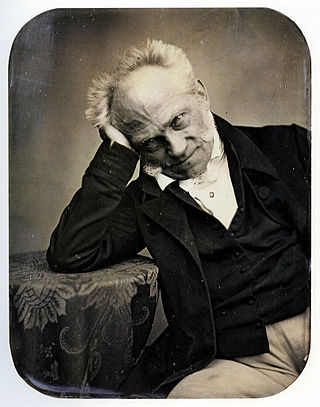
Critique of the Schopenhaurian philosophy is a literary work by Philipp Mainländer appended to Die Philosophie der Erlösung, offering a criticism of the philosophy of Arthur Schopenhauer. Mainländer saw the purification of Schopenhauer's philosophy as the primary task of his life. The criticism had an important impact on Nietzsche's philosophical development.










